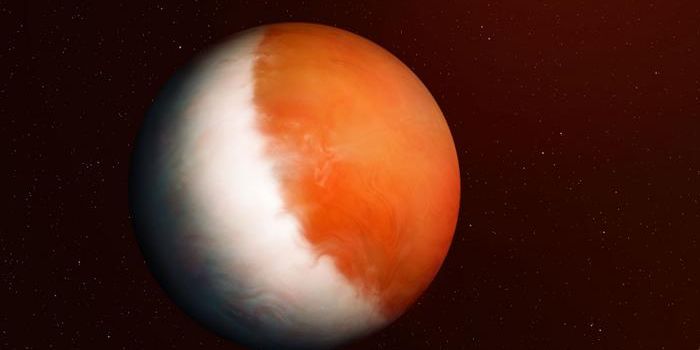First Detection of Frost on Mars' Equatorial Volcanoes
How unique is the climate of Mars compared to Earth? This is what a recent study published in Nature Geoscience hopes to address as a team of international researchers investigated how frost could form on the summits of volcanoes that comprise the Tharsis volcanic province on Mars. This study holds the potential to help researchers better understand the present-day water cycle on the Red Planet and could have implications for harnessing some of it for future human exploration, as well.
For the study, the researchers used more than 30,000 images from the European Space Agency’s Trace Gas orbiter and the European Space Agency’s Mars Express orbiter to analyze morning frost on the summits of Olympus Mons (Mars’ tallest volcano and the tallest planetary mountain in the solar system), Arsia and Ascraeus Montes, and Ceraunius Tholus. Additionally, the researchers used climate model simulations to ascertain if water could condense and form at these summits, as well.
Computer-generated image of Olympus Mons with frost on its summit (blue) (Credit: ESA/DLR/FU Berlin (A. Valantinas))
In the end, the researchers determined the source of the frost is Mars’ atmosphere, which could have implications for better understanding the water cycle on Mars. Additionally, the team determined that the surface temperatures at the summits during the early morning would not result in water condensing and forming on the summits. This sending finding correlates with liquid water being unable to form anywhere on the Martian surface due to the planet’s atmosphere being a fraction of the Earth's atmosphere.
“We thought it was improbable for frost to form around Mars’ equator, as the mix of sunshine and thin atmosphere keeps temperatures during the day relatively high at both the surface and mountaintop — unlike what we see on Earth, where you might expect to see frosty peaks,” said Dr. Adomas Valantinas, who is a postdoctoral fellow at Brown University but conducted the research as a PhD student at the University of Bern, and is lead author of the study. “What we're seeing may be a remnant of an ancient climate cycle on modern Mars, where you had precipitation and maybe even snowfall on these volcanoes in the past.”
Going forward, Dr. Valantinas plans to continue studying Mars while focusing on how microbial life could have lived in ancient hydrothermal environments on the Red Planet deep in its past.
What new discoveries will researchers make about Mars and its unique climate in the coming years and decades? Only time will tell, and this is why we science!
As always, keep doing science & keep looking up!
Sources: Nature Geoscience, EurekAlert!, Brown University









